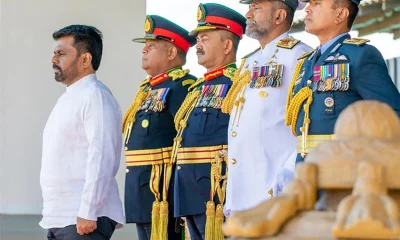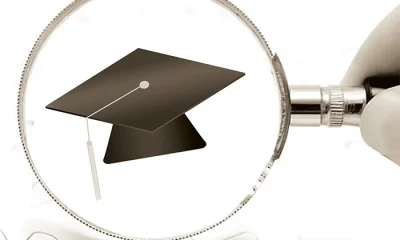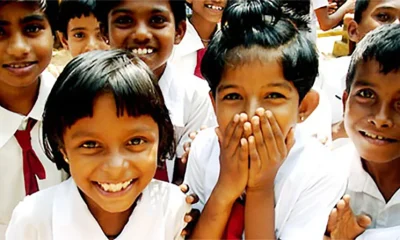Editorial
Robe, politics and karapincha

Wednesday 11th November, 2020
Former Speaker Karu Jayasuriya, who heads the National Movement for a Just Society, has paid a moving tribute to the founder leader of the association, the late Ven. Sobitha Thera. Employing apostrophe for dramatic effect, he has apologised to the Thera for the unfulfilled yahapalana promises. In fact, all yahapalana grandees and their associates should kneel around the statue of Sobitha Thera and ask for forgiveness.
The yahapalana movement was foredoomed to failure. It saw the coming together of a bunch of strange bedfellows inhabiting disparate worlds of ideologies ranging from Marxism to Capitalism, and it was no surprise that the unsteady political project collapsed like a house of cards. The yahapalana politicians got on like a house on fire during their struggle to bring down the Rajapaksas, but lost the plot and fell out after achieving that target.
One of the key protagonists of the yahapalana revolution, Maithripala Sirisena, who left the Rajapaksa government in 2014, condemning it as a repressive regime, defeated President Mahinda Rajapaksa with the help of the UNP, etc., and helped form a UNP-led government in 2015, is now playing second fiddle to the Rajapaksas in the current government. Prime Minister of the yahapalana government, Ranil Wickremesinghe, has lost his parliamentary seat. Many of those who voted for the 19th Amendment unflinchingly backed the 20th Amendment, which was the final nail in the coffin for yahapalanaya.
All yahapalana partners have suffered ignominious electoral setbacks. The UNP, which had 106 members in the previous Parliament, failed to win a single seat at the last general election, and has not yet been able to nominate its National List MP. Its offshoot, the SJB, managed to secure only 54 seats. The JVP has lost three out of its six seats and the TNA six out of its 16 seats. This shows that the architects of yahapalanaya failed to sell their political project to the people in all parts of the country.
Sobitha Thera was disillusioned with what the yahapalanaya turned out to be. He would have taken on the Sirisena-Wickremesinghe government if he had lived longer. He was very critical of that dispensation towards the end of his life. He must have realised that he had been used by the UNP-led forces to capture power. He once called upon President Sirisena to honour the yahapalana promises forthwith. He did not mince his words when he said at a public meeting that the griddle had been heated and Sirisena had to bake the promised roti instead of using it to warm himself. In other words, he told Sirisena that the time was opportune for the abolition of the executive presidency, and it had to be taken by the forelock. Sirisena remained silent with his sphinx-like smile.
Sobitha Thera should have known better than to give a leg-up to a bunch of self-serving politicians who do not scruple to cheat anyone to capture or retain power. The bigwigs of the present regime are doing to the Buddhist monks who helped them with their ascent to power what the yahapalana leaders did to Sobitha Thera. Ven. Muruththettuwe Ananda Thera, one of the prominent monks who were instrumental in bringing the current regime to power, is beginning to sound just like Sobitha Thera, who was offended by the shenanigans of the yahapalana rulers; he is inveighing against the government which has shortchanged him.
Sobitha Thera, however, was wise enough to stay away from active party politics and remain above self-important politicians. Some other monks have not emulated him in that respect. Surely, Sri Lankan politics is a swamp that needs to be drained. Unfortunately, most Buddhist monks who undertook to do so chose to plunge into it and wallow therein in the exalted company of crafty politicians. They have also desecrated the saffron robe by sitting with political dregs in Parliament, which is the Sri Lankan version of the Augean stables. Now, two prominent monks, who came forward to contest the last general election, claiming that their mission was to cleanse politics and liberate the masses, are fighting over a National List seat; their dispute is not unlike the legendary tussle between two Naga leaders, Chulodara and Mahodra, over a jewel-encrusted Throne, in Kelaniya. Unfortunately, the Enlightened One is not there to resolve the ongoing Chulodara-Mahodara fight on the political front.
Buddhist monks who back politicians for political reasons or to achieve social justice with the help of the latter ought to realise that they are only hoping against hope, and what awaits them is the so-called karapincha treatment—they are used and discarded. Ask Muruththettuwe Ananda Thera.
Editorial
Trimming the fat

The decision of the present administration to reduce the army of security personnel allotted to former presidents at enormous taxpayer expense came into effect last week. This will, no doubt, be widely welcomed countrywide. There are five living former presidents and the widow of one (Mrs. Hema Premadasa), enjoying the considerable benefits of the Presidential Entitlements Act which became effective from February 1986. This law was enacted by the government of the country’s first executive president, J.R. Jayewardene, who was the creator of this office and its first incumbent. Though privately wealthy, JRJ obviously looked to the future and the well being of his successors in that powerful office, some of of whom solemnly pledged to abolish it. It was one of many promises that remain undelivered to this day.
The present rulers, by reducing the state-provided security of former presidents and the widow of one has not thrown them to the wolves and the mercy of potential assassins. They will continue to enjoy substantial security cover, now restricted to the police alone rather than a combination of the police and military. As far as we are aware, a protest has been lodged only on behalf of former President Mahinda Rajapaksa by the Sri Lanka Podu Jana Peramuna (SLPP), the political party he leads. While Rajapaksa himself has not been heard protesting, a couple of SLPP officials including a Member of Parliament has publicly criticized the measure.
They seem to regard the war winning president as still at risk from the rump of the LTTE he destroyed in 2009. The Tigers, no doubt, assassinated President Ranasinghe Premadasa and attempted in December 1999 to assassinate President Chandrika Kumaratunga campaigning on the eve of an election seeking a second term. She lost an eye in that terrorist attack where 34 others were killed and over 105 injured. Apart from these, the LTTE successfully assassinated several political heavyweights in Sri Lanka as well as former Prime Minister Rajiv Gandhi in India. At least some in the SLPP seem to think that what remains of the LTTE, whether at home or abroad, makes Rajapaksa still vulnerable.
Last week there was some talk of MR being at risk from a drone attack. This has been discounted as far-fetched by and incumbent deputy minister. In any event there will be continued threat assessments every six months and past presidents (and Mrs. Premadasa) provided security in accordance with these. The fact is that political leaders once upon a time risked their lives and limbs not only at the hands of the LTTE but also at the hands of the JVP, particularly during its second second adventure when it was responsible for many political killings. But all that is water under the bridges and what is relevant at present is whether the leaders of today are currently under risk and require protection at public cost.
During the worst of times, readers will remember, there were road closures for long periods of time when VIPs were whizzing past in motorcades with sirens screaming and massive security backup. But at that time the risk was very real. Then Defence Secretary Gotabaya Rajapaksa narrowly escaped death in 2006 and UNP strongman Ranjan Wijeratne was blown-up by a terrorist bomb in 1991. That is now old hat. The vast majority in the country regard the security accorded to former presidents costing billions totally disproportionate to today’s reality. Hence the decision to limit the task to the police and withdraw the military from the security contingents provided to former leaders. The public have already been treated to photographs of former Presidents Mahinda Rajapaksa and Sirisena posing for group photographs with their departing guards.
Much of the manpower in the police force is assigned to the so-called presidential and ministerial security divisions at the cost of regular policing for the benefit of all the people of the country rather than a few individuals. One advocate of the retention of MR’s security argued that nothing would be saved by the withdrawal of the military as the personnel involved would report back to their detachments and continue as paid soldiers. This contention is not entirely lacking in merit. But its proponent did not take into account that there are factors other than emoluments coming into play. But these would not certainly run into the billions as the total tab does.
Quite apart from the security cost, the other entitlements former presidents draw including pensions, suitable housing, vehicles, office entitlements etc. cost the taxpayer a pretty penny. CBK recently went on record saying she receives a monthly pension of Rs. 94,000 which was not paid for nine years by the MR regime until it was restored by yahapalana. With or without arrears, she did not say. She claims she spends heavily on repairs and maintenance of her official mansion on Independence Avenue, funded by selling her land. She had returned seven assigned vehicles in 2020 in view of the country situation. Currently she has four, two for herself and two for security and she doesn’t mind if those are recalled as she’ll travel by bus.
Maithripala Sirisena, who once solicited public contributions to settle a Rs. 100 million penalty imposed on him by court over the Easter bombs, says he finds security he does not need a hindrance and he doesn’t mind withdrawal. Apart from security, where else the fat will be trimmed is not yet public as the KT Chitrasiri report on these as well as MPs perks and privileges are yet under study. But there is not an iota of doubt that public opinion strongly favours doing away with these and other perks, particularly MPs’ life pensions after just five years of parliamentary service.
Editorial
Rice woes persist

Saturday 28th December, 2024
The JVP-led NPP government has failed to carry out its promise to import rice due to some flaws in the process of preparing tenders. It has asked for some more time to bring in the promised rice from India. Private traders have already imported 72,000 MT of rice. The state sector stands exposed for its inefficiency.
Is it that the new government is not competent enough to carry out even a simple task like importing rice, which successive governments resorted to, as an ad hoc measure, to address the issue of escalating prices of rice, instead of taming the Millers’ Mafia? Why the incumbent administration has botched the process of tendering for rice imports defies comprehension. Has anyone scuttled the government’s import plan in support of the private sector importers, as alleged by the Opposition, and some consumer rights protection groups, which have called for a probe?
It has been pointed out in Parliament that the government is taxing imported rice at the rate of Rs. 65 a kilo and boosting its revenue instead of making a serious effort to make rice available at affordable prices vis-à-vis market manipulations by the Millers’ Mafia. The Opposition has alleged that some powerful millers are also among the rice importers, and they are getting the best of both worlds.
Close on the heels of the JVP-led NPP’s victory in the last presidential election, the owner of Araliya Rice, Dudley Sirisena, who is one of the wealthy millers blamed for manipulating rice/paddy markets and exploiting farmers and consumers alike, promised at a media briefing to ensure that there would be enough rice in the market at the then maximum retail prices stipulated by the Consumer Affairs Authority. The medium/small scale millers panicked and released all their rice stocks to the market, but the millers’ cartel did not do so and is now making the most of the artificially created rice scarcity to earn unconscionable profits.
The government, in its wisdom, increased the maximum retail prices of rice by Rs. 10 and played into the hands of the rice hoarders. As a result, the price of nadu rice has increased from Rs. 230 much to the glee of the powerful millers! The price of this particular variety of rice, which is popular among a majority of Sri Lankans, was about Rs. 180 before the 21 September presidential election.
President Anura Kumara Dissanayake and other JVP/NPP stalwarts have gone on record as saying that the country has produced enough paddy, and the rice shortage is due to hoarding, but the government has baulked at taking on the hoarders and is trying band-aid remedies.
The government has extended the deadline for rice imports until 10 Jan. 2025. The large-scale millers will ensure that more rice is imported before the commencement of the next harvesting period so that they can release some of their stocks, flood the rice market, bring down the prices of rice and exploit farmers by purchasing paddy at cheaper rates. Thereafter, they will hoard their paddy, causing the prices of rice to rise. They also leverage their influence derived from their financial prowess to delay bank loans for small/medium-scale millers so that the latter cannot begin purchasing paddy when harvesting commences.
Previous governments did not care to put an end to the powerful millers’ sordid operations, and the people expected the incumbent administration to be different due to its rhetoric and numerous promises. That is why they voted overwhelmingly for it in last month’s general election, enabling it to secure a two-thirds majority in Parliament. But the millers’ cartel with political connections and huge slush funds, continues to call the shots. Have the people been taken for a ride again?
Editorial
Good riddance!

Friday 27th December, 2024
A cascade of tectonic shifts triggered by the 2022 uprising or Aragalaya during the Gotabaya Rajapaksa government has reshaped Sri Lanka’s politics in such a way that more than 6,000 politicians have so far gone out of circulation, according to an election monitoring outfit. Executive Director of PAFFREL (People’s Action for Free and Fair Elections) Rohana Hettiarachchi has reportedly said those politicians were left with no alternative but to call it quits because they knew that they had absolutely no chance of re-election.
Among them are some prominent figures including political party leaders. This is not something the public bargained for. Those politicians were expected to remain active in politics until they went the way of all flesh. The news of their mass exit from politics must have gladdened many a heart, but the problem is that in this country the political flotsam and jetsam swept away by occasional giant waves like the one we witnessed last month are washed back ashore after drifting for years. There is also no guarantee that the newcomers to politics will be any better.
We have seen mountains in labour groan but deliver mice on several occasions during the past several decades. The current dispensation, which promised a revolutionary change in every sphere, has chosen to maintain the status quo; what we see on the economic front is a continuation of the policies and programmes of the previous regime to all intents and purposes. The JVP-led NPP made a solemn pledge to solve the problem of rice market manipulations, with a single stroke of the presidential pen.
But a cartel of millers continues to exploit farmers and consumers alike, and the government has opted for a shameful capitulation; it has restored to rice imports, which it vehemently condemned previous administrations for. The President’s pen has apparently run out of ink! There is hardly any difference between the new government’s foreign policy and that of the previous administration.
The Gotabaya Rajapaksa government was in the grip of a coterie of self-styled intellectuals, who banded together to form ‘Viyathmaga’, and grabbed key positions in the state sector following the SLPP’s electoral victories. They ruined that regime. The current administration is also swayed by a me-too version of ‘Viyathmaga’, and some of its members have been exposed for flaunting fake doctorates! Above all, it’s all hat and no cattle where the NPP’s promise ‘to catch thieves’ is concerned.
What has unfolded so far under the current administration is like a replay of the early stages of the Yahapalana and SLPP governments. It is hoped that the new leaders will care to bring about the revolutionary change they promised before the presidential and parliamentary polls so that their rule will not end up being something like a remake of an old movie or stage play with a new cast.
“Pity the land that needs a hero”, Brecht has famously said. Since Independence, Sri Lanka has been looking for heroes, fallen for the wiles of numerous bogus messiahs and seen many false dawns. Even a shaman succeeded in making a killing by selling an untested herby syrup, called Dhammika peniya, which was touted as a cure for Covid-19; he even duped some political leaders into swallowing it.
The news about the riddance of 6,000 politicians reminds us of an Aesopian fable, where a fox has one of its legs stuck in a rock crevice in a shallow stream. Having struggled to free itself but in vain, the poor creature is lying exhausted and covered with ticks when a small animal which happens to pass by offers to remove the ticks as it is not strong enough to do anything else.
The fox says the parasites had better be left untouched because they are already bloated and therefore cannot suck anymore blood, and if they are removed another colony of ticks will descend on it and bleed it dry.
Sri Lanka has been in the same predicament as the aforesaid fox all these years; successive governments have drained its Treasury dry with reckless spending and corruption. One can only hope that the new dispensation will be different. Hope is said to spring eternal.
-

 News6 days ago
News6 days agoOffice of CDS likely to be scrapped; top defence changes on the cards
-

 Features6 days ago
Features6 days agoAn Absurd play in Parliament: Qualifications versus education
-

 Opinion7 days ago
Opinion7 days agoWhat AKD and NPP should bear in mind
-

 Midweek Review5 days ago
Midweek Review5 days agoEx-SLN seniors focus on seabed mining and Sri Lanka’s claim for the delimitation of the Outer Continental Margin
-

 Editorial7 days ago
Editorial7 days agoSeeyanomics, rhetoric and reality
-

 Editorial5 days ago
Editorial5 days agoOf that half-open can of worms
-

 Business7 days ago
Business7 days agoS&P Sri Lanka 20 Index undergoes recalibration
-

 Opinion4 days ago
Opinion4 days agoGoing easy on Year 5 Scholarship trial











